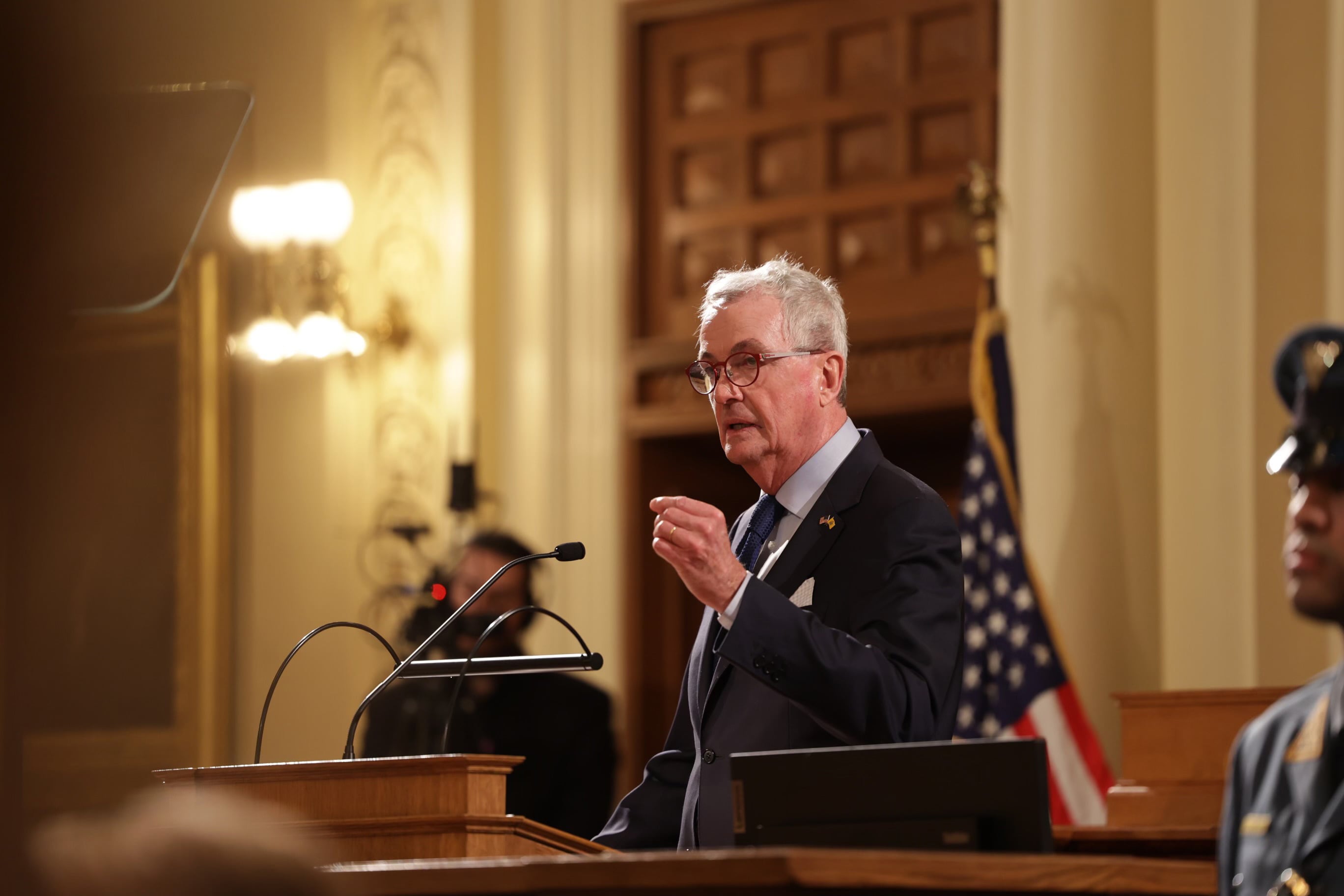Sign up for Chalkbeat Newark’s free newsletter to keep up with the city’s public school system.
Gov. Phil Murphy proposed $11.6 billion for New Jersey’s public schools in his fiscal year 2025 budget address on Tuesday — a historic investment that would, for the first time, fully fund K-12 schools.
The proposed aid, a $908 million increase from the current year, would be Murphy’s final payment into the seven-year plan, outlined by a law he signed in 2018, to fully fund the state’s school aid formula and redirect money to underfunded districts, including Newark Public Schools.
“We will be the first administration in our state’s history to fully fund New Jersey’s school funding formula,” Murphy said to a standing ovation in the Assembly Chambers at the statehouse in Trenton. The speech was streamed on the governor’s social media channels.
Before a room full of lawmakers, former governors, and community advocates, Murphy outlined his $55.9 billion proposed spending plan for the fiscal year beginning July 1. The plan includes major investments in schools, the public transit system, and public worker pensions, in addition to a proposed surplus of $6.1 billion, he said.
But a shortfall in tax revenues, a looming forecast of steep deficits, and other economic hardships could present challenges to fund this plan. Lawmakers will be negotiating and making changes to the proposed budget over the next few months before the deadline of June 30.
“There’s a simple reason why we’re keeping this promise,” Murphy said of the proposed boost in state school aid. “It’s because we need to cultivate the potential of every student anyway we can, whether they live in Cranbury or Camden — and that also means equipping our state’s educators with every tool they need to help our children learn and grow.”
Murphy also proposed other educational investments in the budget. He wants $124 million to go to preschool aid, which would include $20 million to expand preschool programs into new districts and create 1,000 new seats. He also wants an additional $30 million to expand the free school meals program, and to join 34 other states to take part in the Summer EBT program, which aims to combat child hunger during the summer with the help of $60 million in federal funds.
In addition, his plan includes a $2.5 million allocation for a grant program to help school districts acquire literacy screening tools to help children in need of support, a promise he made in his State of the State address last month.
While the proposed budget outlined major funding to support education, there was no sign of funding for the Schools Development Authority, a severely underfunded program meant to help high-poverty districts pay for projects to repair dilapidated school buildings.
A historic boost for school aid
Since 2008, New Jersey has used a weighted student formula created under the School Funding Reform Act to give districts financial support in addition to local taxes to provide every student a “thorough and efficient” education, as stipulated in the state constitution. However, in the 15 years since that formula was established, the state has not provided the full amount owed to underfunded districts.
During his campaign for governor in 2017, Murphy promised to prioritize fully funding the formula. Though his annual efforts to follow through on that promise have received much praise, education advocates say key updates and revisions to the formula are urgent to meet today’s educational needs.
Still, the last seven years of funding increases in state aid has been a marked shift from former Gov. Chris Christie’s administration, which mostly kept state aid flat.
In the state’s 2024 budget, Murphy allotted $10.8 billion for school aid – an $832 million increase from the prior year, as well as $103 million in additional aid approved for school districts seeing reductions in funding based on adjustments to the formula. That budget also included $109 million for the state’s universal pre-K program and $40 million to expand other programs, such as workforce development.
Newark, the state’s largest school district, received $1.2 billion in state aid for the current fiscal year, which was an extra $114 million over last year. Valerie Wilson, the district’s school business administrator, noted last March that the increase in state aid was still $27.7 million short of the amount the district was owed under the formula. Roughly 86% of the district’s budget for the 2023-24 school year came from state aid.
Typically, in the days following the governor’s budget address, the state will send districts the estimated state aid they can expect based on the proposed spending plan. Districts use those estimates to finalize their own budget proposals for next school year.
More funding needed for school buildings
Murphy received a mix of praise and criticism from education organization leaders on his proposed spending plan for next year.
“His efforts to fully fund New Jersey’s education formula, including the proposed $11.7 billion in his FY2025 budget plan, have gone a long way towards meeting the educational needs of students across the state,” said Harry Lee, president and CEO of the New Jersey Public Charter Schools Association, in an emailed statement.
Still, Lee added, public charter schools are in “desperate need of facilities upgrades and renovations,” and he urged lawmakers to consider earmarking funding for the recently established Charter School and Renaissance School Project Facilities Loan Program.
Education Law Center research director Danielle Farrie pressed lawmakers to support Murphy’s school funding formula infusion during negotiations and to consider adding $1 million to support efforts to update the formula. In an emailed statement, she also noted the lack of funding for the Schools Development Authority.
“Reaching full state funding and supporting preschool are just a part of what’s needed to make sure all public schools have the resources to provide a thorough and efficient education for their students,” Farrie said.
The New Jersey Education Association, in a prepared statement, had high marks for the governor’s proposal, but the teachers union also called on legislators to institute “transition aid” for school districts that will see a reduction in funding due to various changes with enrollment or other factors.
Jessie Gómez is a reporter for Chalkbeat Newark, covering public education in the city. Contact Jessie at jgomez@chalkbeat.org.
Catherine Carrera is the bureau chief for Chalkbeat Newark, covering the city’s K-12 schools with a focus on English language learners. Contact Catherine at ccarrera@chalkbeat.org.







